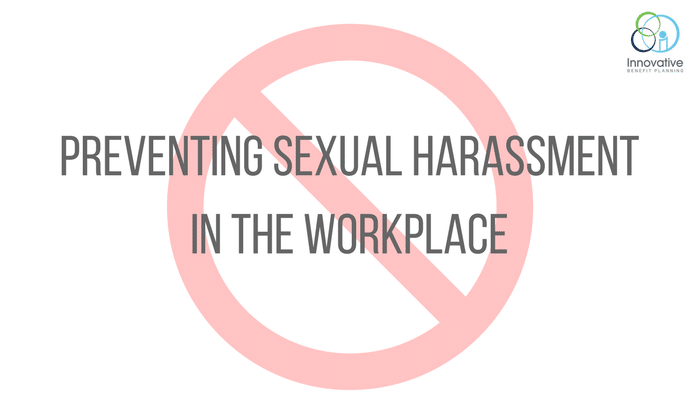Preventing Sexual Harassment in the Workplace

As you may have noticed, with an increase in media coverage regarding sexual harassment in the workplace, now is a good time to think about your company’s practices. Does your company have a sexual harassment policy? Are you confident that the sexual harassment policy has been recently updated and that your employees are aware of the procedure to alert management that such a situation has occurred? Is your management team properly trained to handle these types of situations? Innovative Benefit Planning is committed to ensuring that our clients feel confident that their policies are consistent with federal and state guidance, as well as your company culture. Please contact our HR Consulting Division if you are interested in instituting a sexual harassment policy or re-instituting your current policy at (888) 427-7383. Below please find an overview of sexual harassment and best practice suggestions for your business.
SEXUAL HARASSMENT: DEFINED
Sexual harassment is a form of discrimination that violates Title VII of the Civil Rights Act of 1964. The U.S. Equal Employment Opportunity Commission defines sexual harassment as “unwelcome sexual advances, requests for sexual favors, and other verbal or physical conduct of sexual nature when the conduct explicitly or implicitly affects an individual’s employment, unreasonably interferes with an individual’s work performance, or creates an intimidating, hostile, or offensive work environment.”
SEXUAL HARASSMENT: PREVENTION
Prevention is the best way to eliminate sexual harassment in the workplace. Employers are encouraged to take the necessary steps to prevent sexual harassment from occurring by effectively communicating that sexual harassment will not be tolerated. By providing employees with an established sexual harassment policy and an effective complaint process, your employees will feel confident that your business is a safe space. Establishing an effective grievance process and ensuring that immediate and appropriate action is taken when an employee complains will also provide the company with piece of mind that should an instance of sexual harassment occur, it is handled properly.
Sexual harassment is a serious allegation when brought forward by an employee of the company, therefore, employers are encouraged to investigate the nature of the allegations and the context in which the allegation occurred. By gathering information from all parties, a determination can be made about how best to move forward. Keep in mind that it is unlawful to retaliate against an individual for opposing employment practices that discriminate based on sex, or filing a discrimination charge, testifying or participating in any way in an investigation, proceeding, or litigation under Title VII.
SEXUAL HARASSMENT: EMPLOYER LIABILITY
If an employee still feels that the sexual harassment has continued and is so egregious, the employee may contact the EEOC to file a Charge of Discrimination. In these situations, an employer is automatically liable for harassment by a supervisor that results in a negative employment action such as termination, failure to promote or hire, and loss of wages. If the supervisor’s harassment results in a hostile work environment, the employer can actually avoid liability if they are able to prove that: 1) it reasonably tried to prevent and promptly correct the harassing behavior; and 2) the employee unreasonably failed to take advantage of any preventive or corrective opportunities provided by the employer. The employer will be liable for harassment by non-supervisory employees or non-employees over whom it has control (e.g., independent contractors or customers on the premises), if it knew, or should have known about the harassment and failed to take prompt and appropriate corrective action.
SEXUAL HARASSMENT: BEST PRACTICES
As an employer is ultimately responsible for the actions of their employees, it is not only important to draft a written policy for sexual harassment, but to institute a culture where sexual harassment, is not tolerated, could go a long way in the prevention and the vocalization of sexual harassment in the workplace.
Some suggestions for instituting this culture include communicating to your employees what institutes sexual harassment, ensuring that managers are aware of the company protocol with regard to sexual harassment, and possibly adding sexual harassment training for your human resources personnel.
Further, we would also suggest that if you currently have a sexual harassment policy, that you re-distribute the policy to your employees to raise their level of consciousness. We also highly recommend that managers or supervisors be trained or re-trained on sexual harassment and how best to handle or prevent it. Finally, in light of the way that past, unreported harassment claims may be coming to surface, companies should provide training for how to deal with a past claim that may surface.
If you have questions about your current policy or wish to speak to someone in our HR Consulting Services division, please do not hesitate contact us.
Categories
Archive








